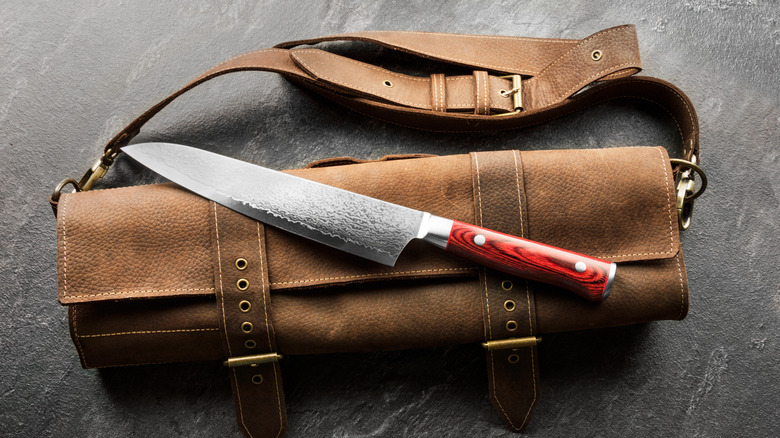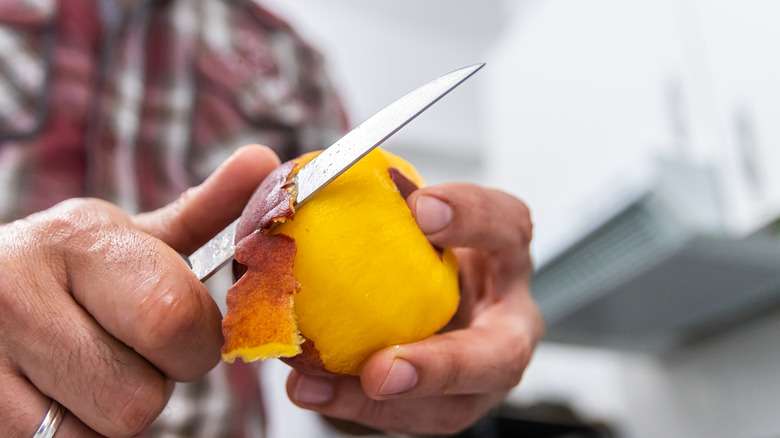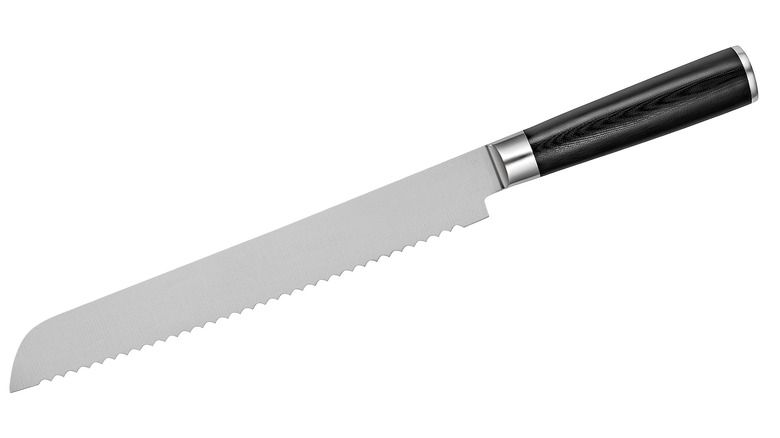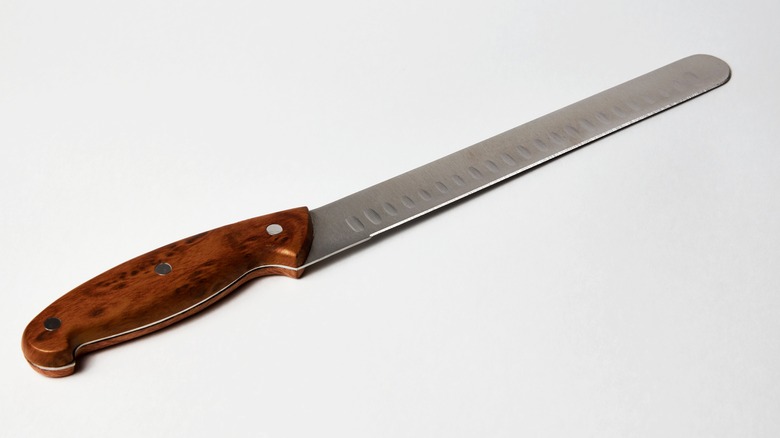Andrew Zimmern Says Home Cooks Need These Knives
While you may not aspire to be a professional chef, it's likely you have goals of cooking delicious meals that make your taste buds sing. Certain kitchen tools can help any chef create a tasty dish, and if sharpening up your culinary skills is on the menu, you might want to start with your knives. Andrew Zimmern, the host of the Magnolia Network's "Family Dinner," is offering up some pro advice about what types of knives you need to set yourself up for success in your kitchen, and regardless if you are a newb to the home cooking scene or a seasoned cook, you may want to take note of this celebrity chef's list.
Good kitchen knives are a necessity. The Huff Post explains sharp knives are probably the most important tool a professional or home cook can own, but as Mel Magazine points out, they are also pretty darn expensive. It's easy to drop a few Benjamin Franklins when you make this purchase, so it's important that the ones you buy are exceptional for slicing, dicing, julienning, and perfecting those butterfly skills. Of course, they should also be able to cut through foods with ease.
Zimmern's list of must-have knives will hopefully aid you in accomplishing those tasks and make chopping up your veggies, fruits, and meats that much easier. What knives made Zimmern's cut?
Five knives every kitchen should have
In a blog post on his website, Zimmern shares that his favorite brand of knives is Shun. However, he also likes Kai, which the "Bizarre Foods" star says are easier on the pocketbook but still offers good quality. But beyond the company that makes your cutting tools, Zimmern recommends five particular knives to help with your cooking prep: A chef's knife, a paring knife, a serrated knife, a slicer knife, and kitchen shears. It's a lot, we know, and perhaps the most important of the five is the chef's knife.
Zimmern explains that you need a chef's knife that's big enough to cut through the fat and tendons of meat, but also one that you can use for cutting up onions, carrots, and even herbs. Food Network concurs and notes that this wide blade knife is generally between six and 10 inches. Think of it as your utility knife because you can, and will, use it for everything. Zimmern confesses that while he prefers an eight-inch knife, if you aren't a professional, you may opt for a six-inch which allows you to work faster and gives you more control. If you are only to ever buy one knife, this would be the one.
If you're in the market for one, here's our list of the best chef's knives of 2022.
Paring knife
The second knife you want to have in your kitchen gadget arsenal is a paring knife. As Zimmern elaborates in his post, a paring knife is for those small, delicate cuts you need to make that are not quite as easily accomplished with a big knife, like slicing garlic, peeling carrots, and cutting smaller items like shallots.
The Food Network refers to this knife as a "miniature" chef's knife and points out that it's usually about four to five inches in length. Per Cook's Illustrated, a paring knife is great for peeling a tomato's thin skin, segmenting an orange, or deveining shrimp. They further explain that this knife is all about hugging those tight corners and getting into those little crevices that a big chef's knife just can't. Additionally, the outlet notes that a paring knife is perfect for poking at meat and roasting vegetables to see how firm or soft they are.
Serrated knife
When it comes to chopping up a pineapple or slicing through a loaf of chewy bread, you need the third knife on Zimmern's list, a serrated knife. A serrated knife is often described as having teeth or little peaks and valleys. However you choose to describe this cutting tool, Zimmern says a big serrated knife can even cut its way through a watermelon, giving you perfect slices to serve. Food Network notes that a longer serrated knife will minimize having to saw with it, which is worth keeping in mind as you are selecting one.
A serrated knife can be a little intimidating though. Zimmern says if you shy away from this type of knife because of the rumors you've heard about keeping it sharp, don't. The cookbook author explains that this knife requires less maintenance because it won't get used with the same frequency as your chef's knife, and when it comes time to sharpen your serrated knife, per Misen, you can purchase a ceramic honing rod and do it yourself. It does take a little time and patience, but so do most things worth doing.
If you're heading out to get one, here's what you need to know when shopping for a new knife.
The slicer and the scissors
The slicer sits in the number four spot on Zimmern's list of must-have knives, while kitchen scissors are the caboose in this line. Why the slicer? Zimmern says he uses it for everything from London Broil to chicken. The Food Network lists this particular knife as an "extra" rather than a priority, but they, too, note that a 10-inch slicer should give you the capability to remove meat from a bone or cut up whatever you might be cooking. Flexibility is what you are aiming for with this handy helper.
And last, but not least, Zimmern says you want a good pair of kitchen scissors. He uses his to cut up an entire turkey, but they also work when you are cutting up a whole chicken. And believe it or not, the utensil you use is not the biggest mistake you're making when cutting a whole chicken.
While Serious Eats concedes your chef or paring knife can probably take care of most, if not all the cutting needs you have to do in your kitchen, a pair of kitchen scissors can do things you might not have considered like opening a jar, cracking seafood shells and nuts, or even popping-off a bottle cap.




